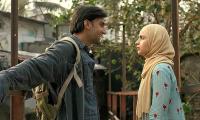 ears ago, a teacher told me: "The great Indian characters in fiction all come from the epics or from languages other than English. The Mahabharata, the Ramayana, [Rabindranath] Tagore, [Munshi] Premchand, and the rest.
ears ago, a teacher told me: "The great Indian characters in fiction all come from the epics or from languages other than English. The Mahabharata, the Ramayana, [Rabindranath] Tagore, [Munshi] Premchand, and the rest.
"Indian fiction in English has produced no great characters, except for Mr Biswas. And his creator, [V S] Naipaul, would deny that he was an Indian writer."
To some extent, she was right. If I had to be stuck on a desert island with a character from fiction, I might choose Amit Roy or Raghupati from Tagore, or Karna from the Mahabharata, or Banalata Sen, or one of Premchand's heroines, or the two chessplayers in Shatranj Ke Khiladi.
If I wanted peace and quiet, and the island was adequately supplied with food, Kumbhakarna would be a very restful companion.
But if I had to draw up a list of invitees to a dinner from the ranks of characters in Indian fiction in English, the table would by no means be empty of guests.
Kim would be somewhere near the head of the table, providing we stretched the definition of Indian fiction a trifle. Kipling's young protagonist, first seen straddling a gun called the Zamzama, might have been the model for future protagonists from the diaspora.
He straddled two worlds, owing allegiance to one but immersing himself in the other. This imaginary dinner would be poorer without the Little Friend To All The World.
Saleem "Snotnose" Sinai would have to be there, too, as midnight's child and history's witness. He bumbled his way through the first decades of independent India, saw history through perforated sheets and from inside laundry bins, sniffed his way sadly down the paths of Emergency.
Salman Rushdie created several memorable characters, but none were as iconic as Saleem. Perhaps he might be accompanied by a younger boy, Haroun from Haroun And The Sea Of Stories, one surrounded by the pickles and
chutneys of history, the other by Plentimaw Fish and blocked stories and hoopoes.
You would have to place Gustad Noble, from Rohinton Mistry's Such A Long Journey, directly opposite Saleem Sinai. Both characters were on similar quests, both were reluctant players in the great game of contemporary
Indian history, and Gustad has a pathos, a humour and a quixotic nobility that makes him unforgettable.
Next to Gustad, we might seat Swami, from R K Narayan's Malgudi Days. He would be fiercely solemn in his mundu and veshti, even if the schoolboy's feet didn't quite reach the ground.
He might have a great deal to say, despite the difference in background, to Ruskin Bond's Rusty; one braved the ordeals of cricket and shifting friendships and school in a small but unforgettable village, one was a restless wanderer in the hills, but they have a lot in common.
The presence of H Hatterr from G V Desani's All About H Hatterr, master of the torrential sentence and endless spools of punning dialogue, would ensure that there was no lull in the conversation.
If you seated him next to I Allan Sealy's Great Trotter, from The Trotter-nama, there is no telling what might be the outcome -- merging the two eccentrics would lead to one of the strangest books ever written.
All of this, naturally, would be observed with care by Lata from Vikram Seth's A Suitable Boy, who would be the quietest person at the table but perhaps the shrewdest observer.
Her silence would undoubtedly be filled by her mother, Mrs Rupa Mehra, with a rambling narrative about her many ailments, the virtues of homemade cards, and the perennial ingratitude of children.
But even Mrs Rupa Mehra might be no match for Kiran Nagarkar's Meerabai from Cuckold, stubborn, fiercely intelligent, and given to unabashed displays of adoration for her elusive Krishna, never mind where she might be and in what company.
The next group would be somewhat motley. Slightly stoned, emerging from a world where statues of Gandhi are rudely propped up by a particularly unfortunately placed stick, attempting to live up to a dignity he doesn't feel and bored out of his skull -- that would be Agastya Sen from Upamanyu Chatterjee's English August.
His companions would be Bakha, the sweeper from Mulk Raj Anand's The Untouchable, who would, even in this day and age, be made to feel out of place at the table.
Bakha's burning rage against the machine that refused to recognise his humanity might be hard to match. The only person at the table who might understand Bakha, with a cold and tired cynicism, would be a policeman lounging at the back-as a character in a short story, Vikram Chandra's Inspector Sartaj could not be extended a full invitation, but his
brooding, bitter presence is necessary in this room.
Vying with Hatterr to dominate the conversation would be Nur, the embittered poet with the dark history from Anita Desai's In Custody; watching in bemusement a short distance away might be Baumgartner, from Baumgartner's Bombay.
There would just about be room for Rahel and Estha from Arundhati Roy's The God Of Small Things, but only for the characters as children; the adult Rahel and Estha wouldn't quite make the cut.
They would have enough in the way of matters to comment on in capital letters, though, if you also made room for the melodramas of Roop and Satya from Shauna Singh Baldwin's What The Body Remembers.
Their breastbeating and machinations would hold Amitav Ghosh's Alu, the compass-wielding protagonist of The Circle Of Reason, in fascinated thrall, but then Alu was always a very silent hero.
This would be a strange dinner party, but a rewarding one; imagine the cacophony of views, histories and conversation, imagine Saleem Sinai sniffing out the recesses of Hatterr's mind, Alu and August lined up together, Gustad Noble in shy conversation with Lata.
It's a small enough band, compared to the gigantic shamiana you would have to erect to host the hordes of great characters who would come pouring out of the books of Indian fiction proper, but it's not a bad start.
And, of course, some seats at the table would be left empty, for future guests or for those who have been unfairly left out.









